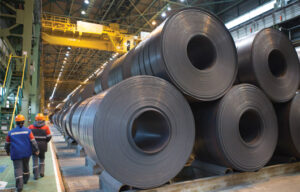
Metinvest Mining and Metallurgical Group increased its exports of steel products to Poland by about 16% year-on-year in 2023 to over 800 thousand tons from about 700 thousand tons in 2022.
According to Yulia Mezentseva, Head of Logistics at Metinvest Polska, in an interview with the leading Polish publication Puls Biznesu, the increase in cargo traffic is facilitated by the unblocking of routes, but transshipment in ports and border crossings remain bottlenecks.
It is also noted that despite the war, Metinvest is expanding its operations in the Polish market.
“2023 was slightly better for us than the previous year. There were no more congestion and queues on the Polish railway network, which contributed to an increase in transportation efficiency. Compared to the previous year, we recorded a 16% increase in tonnage. We transported a total of 1.9 million tons through Polish ports and railways, of which about 1.3 million were steel products, 378 thousand were iron ore and 237 thousand were coking coal,” Mezentseva stated.
Out of the total volume of products delivered from Ukraine to Poland, 939 thousand tons were exported to other countries through Polish ports.
“The coal needed for our steel plants in Ukraine was also transshipped in Polish ports,” the manager said.
Some of the goods brought from Ukraine to Poland were delivered by rail or truck to Germany, the Czech Republic, Italy, Slovakia, and other countries.
Mezentseva clarifies that iron ore used to dominate the structure of supplies from Ukraine, but now it is mainly steel products that are imported. According to the country’s Metallurgical Chamber of Commerce and Industry, Ukraine is the largest non-EU steel supplier to Poland.
The head of logistics at Metinvest Polska predicts that in 2024, Metinvest will at least maintain and perhaps even slightly increase the volume of supplies of some goods to the Polish market. It assumes that their structure will change, especially the volume of steel imported from Ukraine.
For their part, local producers fear that if demand in Poland starts to grow, Ukrainian steel will flood our market. Przemyslaw Sztuchkowski, president of Cognor, even suggests introducing limits on the supply of steel products from Ukraine to the EU. The idea is to allow free transit through Poland to other countries and to ensure that the volume of imports on the Polish market does not threaten the stable operation of Polish producers.
At the same time, Mezentseva states. “In 2021, 1.2 million tons of our steel products were sold directly to the Polish market, 0.7 million tons in the previous year, and 0.8 million tons in 2023. Due to the war, we have limited opportunities to grow production and supplies,” she notes.
In addition, she draws attention to the problems with the transportation of goods across the Polish-Ukrainian border and transshipment in ports, which impede supplies to our market and transit by sea.
“The Polish-Ukrainian agreement stipulates that six trains a day with steel and ore should pass through the wide gauge at the Medyka border crossing. In practice, three or four are allowed through, as the Polish border and railroad administrations give priority to other transport. Therefore, we often have to wait for a long time at the border, which increases our costs. For every hour of downtime, we have to pay CHF 1.9 per commercial wagon,” says Mezentseva.
She suggests that one of the reasons for the long queues at the border could be the recent protests by Polish carriers and farmers.
“The queue on the Ukrainian side sometimes reached 70 kilometers. In the case of delicate goods that needed to be delivered quickly to customers, we sometimes decided to change modes of transportation and transfer goods from cars to trains to avoid standing in a very long line,” says the manager.
She hopes that the suspension of the protests will facilitate uninterrupted transportation by road and rail. She emphasizes that after crossing the border, transportation through Poland is quite efficient.
“In 2022, we often had to wait on the access roads, but now PKP PLK has significantly improved the capacity of the roads leading to the ports,” says Mezentseva, adding that access to the terminals is almost hassle-free, but there are difficulties with transshipment.
“Bulk cargo, such as iron ore and coal, is transshipped much faster than steel products. Transshipment in Polish ports is four times slower than at Black Sea terminals,” Mezentseva said.
According to her, one of the reasons for this may be the lack of staff at the terminals.
The Metinvest representative also points out that Polish customs regulations do not take into account changes in the weight of bulk cargo during transit. However, they can occur, for example, due to weather conditions. Therefore, employees of transportation and transshipment companies have to spend a lot of time during inspections explaining that coal or ore may weigh a little more in rainy weather. There may also be so-called natural losses during transportation.
“Railroad rules allow a certain percentage of deterioration for different groups of goods. Customs rules, on the other hand, do not allow any losses that are subject to individual inspection by the service. For us, this means significant losses,” emphasizes Mezentseva.
Metinvest Group notes that it is interested in building long-term business relations in the Polish market.
“We are talking about challenges, but we are ready to work out solutions together with the Polish side. We want to simplify procedures and transportation,” adds the Head of Logistics at Metinvest Polska.
“Metinvest is a vertically integrated group of steel and mining companies. The group’s enterprises are located mainly in Donetsk, Luhansk, Zaporizhzhia and Dnipro regions.
The main shareholders of the holding are SCM Group (71.24%) and Smart Holding (23.76%), which jointly manage it. Metinvest Holding LLC is the management company of Metinvest Group.
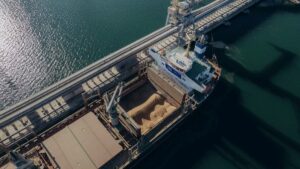
The bulk carrier PUMA has left the port of Odesa with 30,000 tons of rapeseed and metal, becoming the fifth vessel to use the temporary evacuation corridor from Ukraine’s Black Sea ports since September 15, according to Deputy Prime Minister and Head of the Ministry of Reconstruction Oleksandr Kubrakov.
“Due to the blocking of the #BSGI (Black Sea Grain Initiative) and the world’s growing demand for agricultural products, Ukraine is considering the possibility of using the corridor for ships with non-military cargo, especially agricultural products, mainly to Africa and Asia,” he tweeted on Friday.
30 rapeseed, lport, METAL, ODESA, PUMA
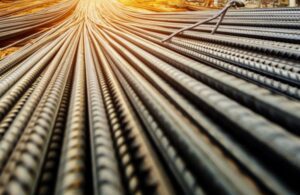
Ukrainian enterprises in January-October this year increased their consumption of rolled metal by 19.42% compared to the same period last year, to 4.324 million tonnes. According to a press release of the Ukrmetalurgprom association on Tuesday, during this period 969,700 tonnes were imported, or 22.43% of the domestic market for rolled metal consumption.
“In January-October 2021, the capacity of the domestic market amounted to 4.324 million tonnes of rolled metal, of which 969,700 tonnes, or 22.43%, accounted for imports. In January-October 2020, the capacity of the domestic market was 3.621 million tonnes, of which 1.028 million tonnes, or 28.38%, were imported. Thus, in ten months of 2021, there is an increase in the capacity of the domestic market for rolled metal products by 19.42% compared to January-October 2020, with a simultaneous decrease in the import share by 5.96%,” the press release states.
At the same time, the structure of imports in January-October 2021 is characterized by a significant domination of flat products over long products (54.66% and 42.28%, respectively); in the same period of 2020, a domination of flat products over long products was practically comparable with 2021 (56.38% and 42.44%, respectively).
According to Ukrmetalurgprom, in January-October-2021, Ukrainian metallurgical enterprises produced 15.99 million tonnes of rolled metal (105.4% compared to January-October 2020), of which, according to the information of V.S.K. Group LLC, about 12.63 million tonnes, or 79%, were exported. Over ten months of 2020, the share of exports was 82.9% (12.58 million tonnes with total production of 15.17 million tonnes of rolled metal).
The share of semi-finished products in export supplies accounted for 46.17% over ten months of 2021, which is lower than the indicator for the same period in 2020 (51.03%). The share of flat-rolled products in export supplies in January-October 2021 is noticeably higher than in January-October 2020 (37.86% and 32.08%, respectively). The share of long products in export supplies is slightly inferior to the indicator for the same period last year (15.98% in 2021 versus 16.88% in 2020).
According to V.S.K. Group, the main export markets of Ukrainian metal products in January-October 2021 were the European Union (36.5%), other European countries (20.1%) and NAFTA countries (9.7%).
Among metallurgical importers over ten months of 2021, the CIS ranks first (35.4%), the second is the countries of Asia (21.6%) and the third is the EU-27 (20.5%).

Ukrainian metal companies in January-May 2021 increased earnings from exports of ferrous metals by 49.1% compared to the same period last year, to $4.92 billion.
According to the statistics released by the State Customs Service, in May, earnings from exports of ferrous metals amounted to $1.19 billion.
Ukraine boosted imports of similar products by 16.3% in January-May 2021, to $440 million. In May, this figure was $115.04 million.
In addition, Ukraine increased exports of metal products by 18.9% in the first five months of 2021, to $421.03 million. In May, their export amounted to $99.21 million.
During this period, imports of metal products increased by 22.2%, to $383.15 million. In May, they were imported for $93.12 million.
As reported, in 2020, Ukrainian metal companies reduced earnings from exports of ferrous metals by 12% compared to the previous year, to $7.690 billion. At the same time, Ukraine in 2020 reduced imports of similar products by 17%, to $1.040 billion.
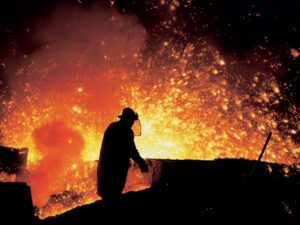
Ukraine may lose EUR 700 million due to restrictions on the supply of Ukrainian metal products as part of the introduction by the European Union of the Carbon Border Adjustment Mechanism (CBAM), according to a study by the information and analytical center GMK Center presented at a roundtable devoted to the impact of CBAM on the metallurgy of Ukraine held on April 9.
According to the press release, early March 2021, the European Parliament approved a resolution introducing the Carbon Border Adjustment Mechanism (CBAM). The European Union regards the CBAM as a special fiscal instrument that will force manufacturers of imported products to pay the same price for CO2 emissions that European producers pay. The official proposal for CBAM from the European Commission is expected to appear by the end of the second quarter of 2021. CBAM is planned to be in effect no later than 2023.
According to the study conducted by analysts of GMK Center, the negative impact on the metallurgy of Ukraine from the introduction by the European Union of the CBAM can reach EUR 700 million, or 0.5% of the gross domestic product compared to 2019.
“The metallurgical industry of Ukraine will be one of the most affected as a result of the introduction of CBAM. This will happen due to our close partnership with the EU. After all, domestic metallurgists supply 26% of marketable products to the European market, which is more than to our domestic market. Our competitors do not have such a high dependence on the EU market. The introduction of the CBAM will mean a decrease in the competitiveness of Ukrainian exports, losses for the domestic economy, a rupture of production chains between European and Ukrainian enterprises,” Director of GMK Center Stanislav Zinchenko said.
According to him, the annual export losses of Ukrainian metallurgy from the introduction of CBAM by the European Union are estimated at EUR 155-200 million per year, depending on the scenario. It will also reduce the financial results of the industry by EUR 105-200 million per year.
The CBAM covers about EUR 2.5 billion of metallurgical exports per year. The exact scale of damage to national producers depends on the form of implementation of the CBAM.
As a result of the effect of the carbon tax, one can expect a decrease in the volume of pig iron production by 500,000 tonnes (2.5% down compared to the level of 2019) and long products (including square billets) by 110,000 tonnes (1.4% down).
According to Chief Analyst at GMK Center Andriy Tarasenko, this could also lead to a decrease in the volume of capital investments in the amount of up to EUR 130 million per year (12% down compared to the level of 2019). In the long run, this will mean chronic investment lag and a competitive disadvantage.
“The CBAM should not be applied to Ukraine, since we have already taken on the goals of the European Green Deal. The exclusion of Ukraine from the CBAM, on the contrary, will be an incentive for the Ukrainian economy,” Zinchenko said.
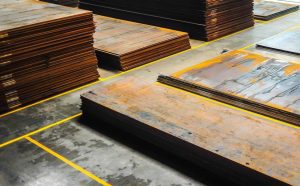
Metallurgical enterprises of Ukraine in January-March 2021 increased receipts from exports of ferrous metals by 29.7% compared to the same period last year, to $2.670 billion.
According to updated statistics released by the State Customs Service on Friday, ferrous metals accounted for 19.44% of total receipts from the export of goods during this period versus 16.79% in the first three months of 2020.
In March, revenues from exports of ferrous metals amounted to $1.160 billion.
At the same time, Ukraine in January-March 2021 reduced imports of similar products by 3.9%, to $214.215 million. In March, this figure was $92.685 million.
In addition, Ukraine in January-March 2021 increased the export of metal products by 10.4%, to $236.069 million. In March, metal products for $ 95.530 million were delivered.
During this period, the import of metal products increased by 6.5%, to $209.229 million. In March, metal products for $83.853 million were imported.
© 2016-2025, Open4Business. All rights reserved.
All news and diagrams placed on this Web site is made for internal use. Its reproduction or distribution in any form are welcome in case of placing a direct hyperlink to a source. Reproduction or distribution of information which contains Interfax-Ukraine as a source is prohibited without the written permission from the Interfax-Ukraine news agency. Photoes placed on this site are taken from open sources only; rightholder are welcome to make demands to info@open4business.com.ua , in this case we are ready to put your copyright to a photo or replace it.